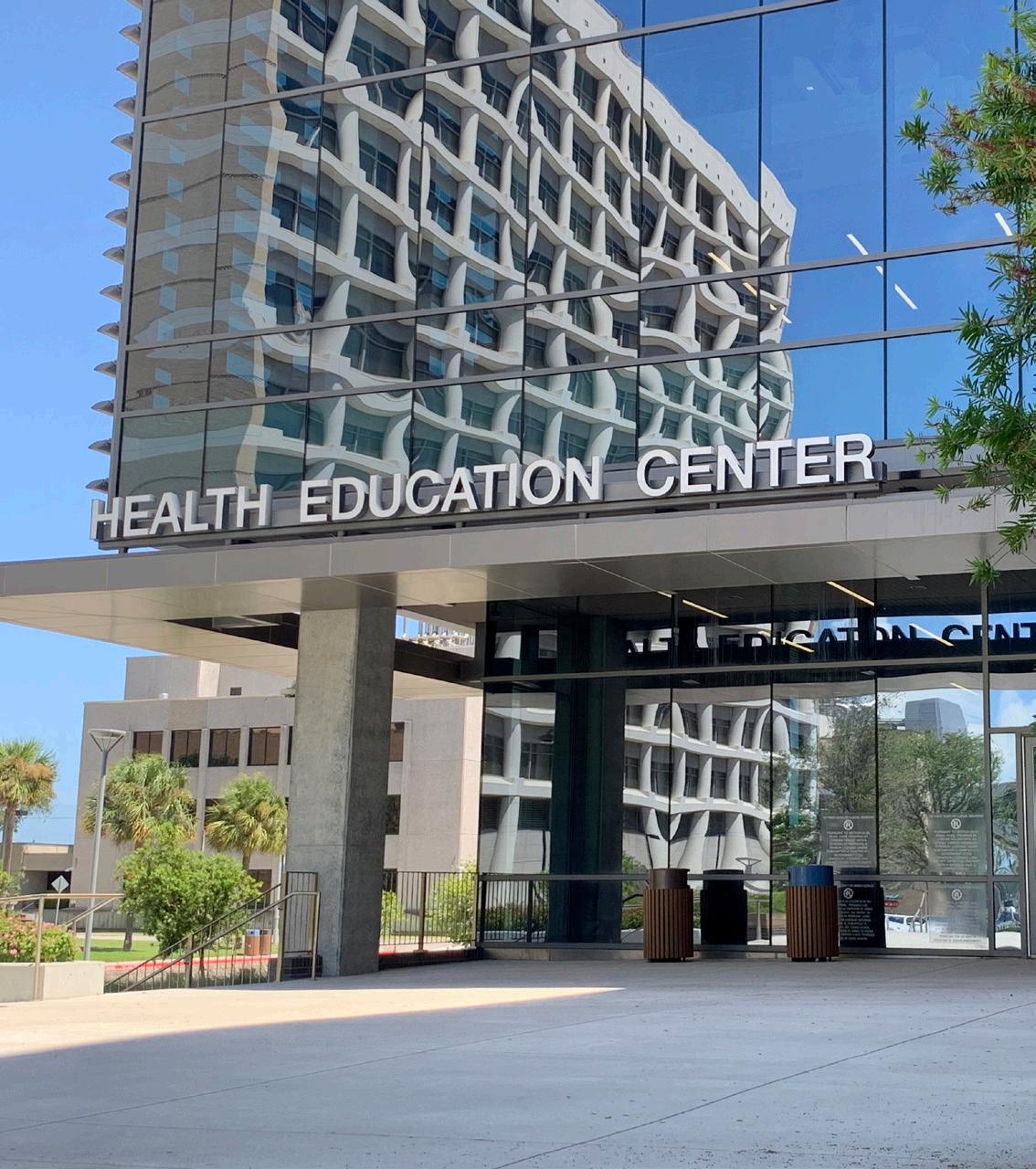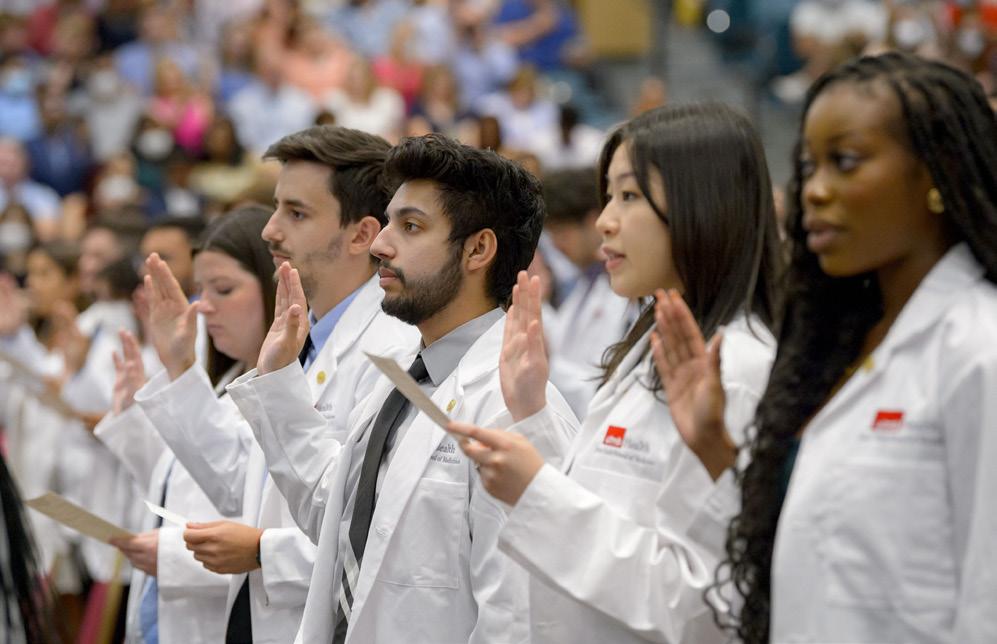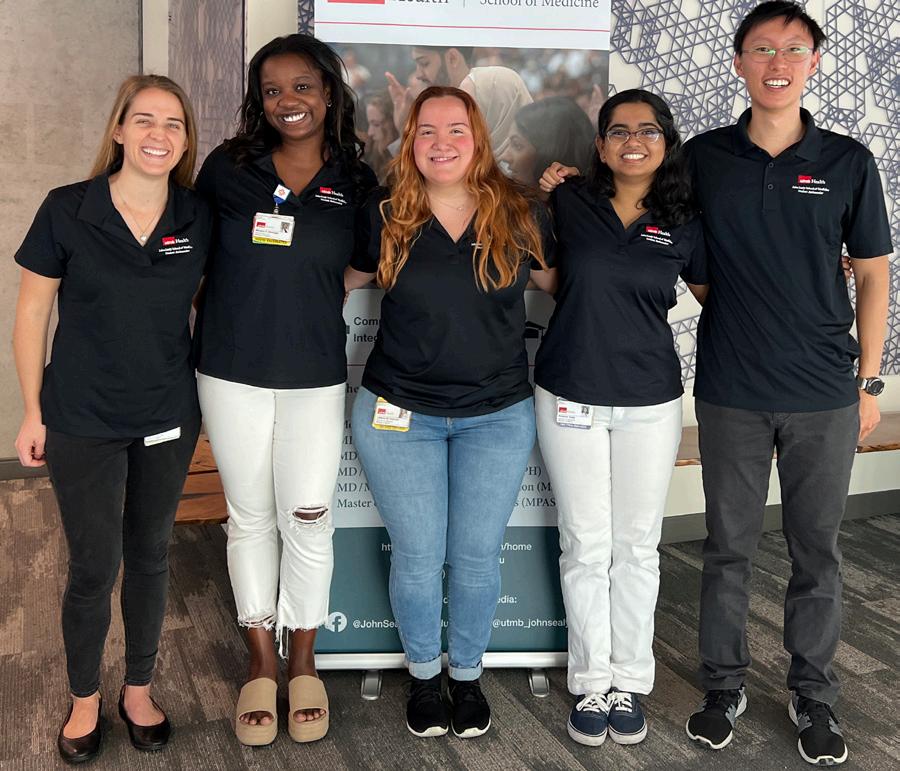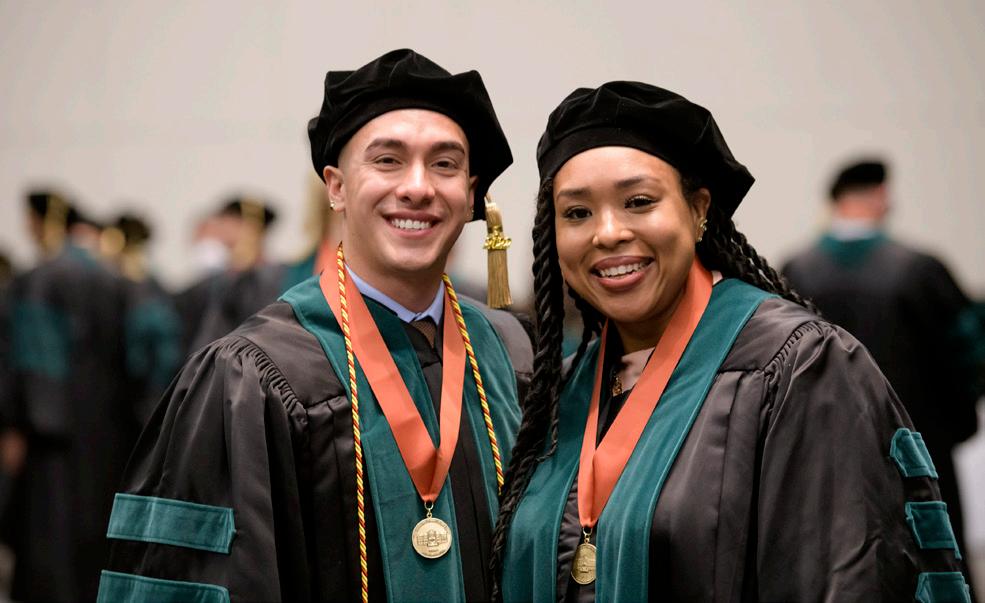THE UNIVERSITY OF TEXAS MEDICAL BRANCH AT GALVESTON


MISSION
VALUES • We
• We
•
•
•
To improve health for the people of Texas and around the world by offering innovative education and training, pursuing cutting-edge research and providing the highest quality patient care. VISION We work together to work wonders as we define the future of health care and strive to be the best in all our endeavors.
demonstrate compassion
always act with integrity
We show respect to all
We embrace diversity
We promote lifelong learning
to the University of Texas Medical Branch at Galveston (UTMB) John Sealy School of Medicine. UTMB has had the distinct honor of training exceptional physicians in Texas for more than 130 years. We are a leader in medical education, encompassing thriving research and clinical enterprises across four campuses and six hospitals.

COME JOIN THE LEGACY! WHY UTMB? ◆ Individualized and group academic support services ◆ Diverse patient population ◆ Community engagement and experiential learning opportunities ◆ Leaders in medical education ◆ Collaborative learning environment ◆ 95 local and regional clinic locations ◆ Correctional Managed Care program serves more than 90,000 offenders in Texas prisons ◆ Large number of alumni practicing in Texas (over 4,000) Welcome!
Welcome
DEMONSTRATING PERSONAL CHARACTERISTICS
COLLABORATION
Group projects, leadership roles in organizations, campus involvement, goal-oriented activities
COMPASSION
Service-based activities, experiences with underserved or vulnerable populations, desire to connect with others, service-learning projects
CONSCIENTIOUSNESS
Academic honors, extensive history of extracurricular activities, retaking coursework as needed, seeking support and mentorship
CULTURAL HUMILITY
Self-reflection, active listening, advocacy, respectful partnerships, cross-cultural experiences
CURIOSITY
The examples listed here are not to encourage "box checking." Rather, they are examples of meaningful experiences that an applicant can provide as evidence of the desired character trait.
Research experience, publications, writing grants, establishing new organizations
FRESHMAN YEAR
• Keep your grades up
• Start a habit of personal reflection
• Build a support network and meaningful relationships
• Meet with pre-medical advisors
• Join and participate in pre-health clubs
• Maximize summer by volunteering, shadowing, participate in researching, taking coursework or working
SOPHOMORE YEAR
• Complete prerequisite coursework
• Check-in with professors, advisors, and supervisors for letters of evaluation
• Pursue meaningful activities that mirror your personal values and interests: volunteering, shadowing, research, leadership
JUNIOR YEAR
• Begin studying for the MCAT
• Pursue upper-level science coursework
• Continue participation in pre-health clubs, health care related experiences, volunteer activities, research and leadership roles.
• Identify individuals to write letters of evaluation and complete your essays
• Research and identify schools you are interested in
SUMMER OF SENIOR YEAR
• Complete and submit primary and supplemental applications
• Submit supporting documentation (letters and test scores)
• Retake MCAT if needed and take Casper
• Begin preparing for interviews
SENIOR YEAR
• Maintain academic success
• Prepare for interviews
• Review financial aid and scholarships
• Complete remaining prerequisite coursework
• Finish strong!
YOUR JOURNEY BEGINS HERE
START
|
STRONG
Bilingual Health Community Engagement Global Health Geriatric Health Public Health Physician Healer Rural Health Translational Research Areas of Scholarly Concentration Dual Degree Opportunities M1 | Pre-Clerkship M2 | Pre-Clerkship M3 | Core Clerkship M4| Post-Clerkship Phase (sample) JUN JUL AUG SEP OCT NOV MCT Longitudinal Practice of Medicine (POM 1) (32 weeks) POM 1 Orientation Mindfully Evolving, Thinking & Advocating (META) (6 weeks) Gross Anatomy & Radiology (GAR) (9 weeks) Molecules, Cells & Tissues (7 weeks) Thanksgiving JUN JUL AUG SEP OCT NOV GIN POM 2 Summer Break Cardiovascular & Pulmonary (CVP) (10 weeks) Fall Break Renal, Fluids & Electrolytes (RFE) (7 weeks) Gastrointesinal & Nutrition (GIN) (7 Weeks) Thanksgiving Longitudinal Practice of Medicne 2 (POM 2) (36 weeks) POM 2 JUN JUL AUG SEP OCT NOV Track 2: Procedural &
Child Block Surgery (8 weeks), OB/Gyn
weeks), Pediatrics
Neonatal & Delivery
weeks) JUN JUL AUG SEP OCT Electives (2 weeks) Intro to Clerkships Clinical Skills (ICCS) (4 weeks) Track 1: Medicine, Brain & Behavioral Block Internal Medicine (8 weeks), Family Medicine (4 weeks), Neurology (2 weeks), Required Elective
weeks), & Psychiatry
weeks) Assessment & Concept Integration (ACI)
weeks) Longitudinal Health Systems Science (HSS) & Community Service (4 modules - 4 week blocks) Acting Internship (4 weeks) Step 2CK Study (4 weeks) Emergency Medicine Selective (4 weeks) Specialty Specific Elective Second Clinical Elective Elective or Banked Elective Credit Basic Humanities Selective (4 NOV Majority of Residency *Sample – The curriculum is consistently assessed and adjusted as needed.
Maternal
(4
(4 weeks),
(4
(2
(4
(4
Bilingual Health Community Engagement Global Health Geriatric Health Public Health Physician Healer Rural Health Translational Research MD Master of Public Health (MPH) MD Master of Science (MS) MD Master of Arts (MA) MD Master of Business Administration (MBA) MD PhD Combined Degree Program Areas of Scholarly Concentration Dual Degree Opportunities CURRICULUM | SCHOLARLY CONCENTRATIONS | DUAL DEGREES DEC JAN FEB MAR APR MAY Winter Break Pathology & Host Defenses (PHD) (8 weeks) Neuroscience & Human Behavior (NHB) (8 weeks) Summer Break (8 weeks) Clincical Preceptorships Research Vacation (up to two, 4-week blocks) POM 1 DEC JAN FEB MAR APR MAY Winter Break Endocrine & Reproduction (EER) (6 weeks) Dermatology, Heme & Musculoskeletal (DHM) (6 weeks) USMLE Study / Exam (8 weeks) Research / Clinical Electives POM 2 DEC JAN FEB MAR APR MAY Track 2: Procedural & Maternal Child Block Surgery (8 weeks), OB/Gyn (4 weeks), Pediatrics (4 weeks), Neonatal & Delivery (4 weeks) ACI (2 weeks) Begin M4 Track 1: Medicine, Brain & Behavioral Block Internal Medicine (8 weeks), Family Medicine (4 weeks), Neurology (2 weeks), Required Elective (2 weeks), & Psychiatry (4 weeks) Elective or Vacation (4 weeks) Winter Break (1 week) Transition to Residency (TTR) (4 weeks) Elective or Banked Elective Credit Graduation Longitudinal Heath Science System (HSS) & Community Service (Cont.) MAY Basic Science & Humanities Selective (BSHS) (4 weeks) Elective or Banked Elective Credit Elective or Banked Elective Credit DEC JAN FEB MAR APR Residency Interview Dates
English 6 9
Biological Sciences* 14 21
Mathematics** 3 5
Physics* 8 12
Chemistry, General* 8 12
Chemistry, Organic* 8 12
Biochemistry*** 3 5
* As required for college science majors. Must include 2 semester hrs or 3 quarter hrs of formal lab.
** College Calculus or Statistics
***Biochemistry requirement becomes effective during the 2023-2024 admissions cycle.
Applicants must complete at least 90 semester hours. ◆ Prefer applicants complete a baccalaureate degree before starting medical school classes. ◆ Minimum grade of C is required in each course. ◆ Coursework must be completed at regionally accredited U.S. colleges and universities. ◆ No MCAT score older than 5 years will be accepted. ◆ Only applicants who are permanent US residents or American citizens will be considered for interview and admission.
JSSOM Supplemental Application
Candidates will receive an email invitation from UTMB with instructions on how to complete the supplemental application once the Texas Medical and Dental Schools Application Service (TMDSAS) application has been processed. No applicant will be invited for an interview without the submission of a completed supplemental application.
Casper Exam Score
Casper (Computer-Based Assessment for Sampling Personal Characteristics) is an online admissions test that assesses for non-cognitive skills and interpersonal characteristics that we believe are important for success as students and graduates of our program. It will complement the other tools that we use for applicant screening and ranking. JSSOM also encourages applicants to complete all Altus Suite assessments.
COURSEWORK SEMESTER HRS QUARTER HRS
must be invited for a virtual interview to be considered for admission. Approximately 40 to 60 applicants per week are interviewed utilizing a Multiple Mini Interview (MMI) format. The UTMB MMI consists of seven 8-minute interviews. Applicants are interviewed by faculty, staff, residents, and students. During one of the interviews, you will have the opportunity to sell yourself, discuss your interest in JSSOM, and ask questions of our faculty.


ADMISSIONS REQUIREMENTS
Sample Interview Day Schedule ◆ Welcome, Introductions, and Icebreaker ◆ Welcome from the Dean ◆ Curriculum Presentation ◆ Q&A with a Curriculum Dean ◆ Campus Tour Video ◆ Morning or Afternoon MMI ◆ Virtual Student Panel
Interviews You
Admissions Timeline
TMDSAS application opens Deadline for letters of evaluation 11th–Secondary application closes
season
Deadline to submit ranking of schools J U
Y A U G U S T O C T O B E R
begins reviewing applications
ends
Alternate pool noti cations TMDSAS Match Spring Peek M A Y N O V E M B E R J A N U A R Y M A R C H / A P R IL F E B R U A R Y
Interview
begins
L
Admission Committee
Interview season
Medical schools begin extending offers of acceptance 27th Last day to take Casper
ADMISSIONS TIMELINE AND CLASS PROFILE 30 30 % % Reapplicants Reapplicants Asian Asian Hispanic Hispanic African African American American Underrepresented Underrepresented in Medicine in Medicine White/Other White/Other 37 37 % % 11 11 % % 24 24 % % 34 34 % % 31 31 % % Undergraduate Undergraduate Schools Schools 61 61 94 94 % % Texas Residents Texas Residents 13 13 % % First Generation First Generation College Students College Students 7 7 % % LGBTQ+ LGBTQ+ 5,461 Male Male 48% 48% Female Female 52% 52% Average Average Overall GPA Overall GPA Average Average Science GPA Science GPA Average Average MCAT MCAT 3.80 3.80 3.74 3.74 511 511 990 230 Applications Applications Interviews Interviews Entering Class Entering Class 30 30 % % Reapplicants Reapplicants Asian Asian Hispanic Hispanic African African American American Underrepresented Underrepresented in Medicine in Medicine White/Other White/Other 37 37 % % 11 11 % % 24 24 % % 34 34 % % 31 31 % % Undergraduate Undergraduate Schools Schools 61 61 94 94 % % Texas Residents Texas Residents 13 13 % % First Generation First Generation College Students College Students 7 7 % % LGBTQ+ LGBTQ+ 5,461 Male Male 48% 48% Female Female 52% 52% Average Average Overall GPA Overall GPA Average Average Science GPA Science GPA Average Average MCAT MCAT 3.80 3.80 3.74 3.74 511 511 990 230 Applications Applications Interviews Interviews Entering Class Entering Class




Follow us on Social Media: @ JohnSealySOM.edu @utmb_johnsealy_som https://www.utmb.edu/som/home somadmis@utmb.edu (409) 772-6958











